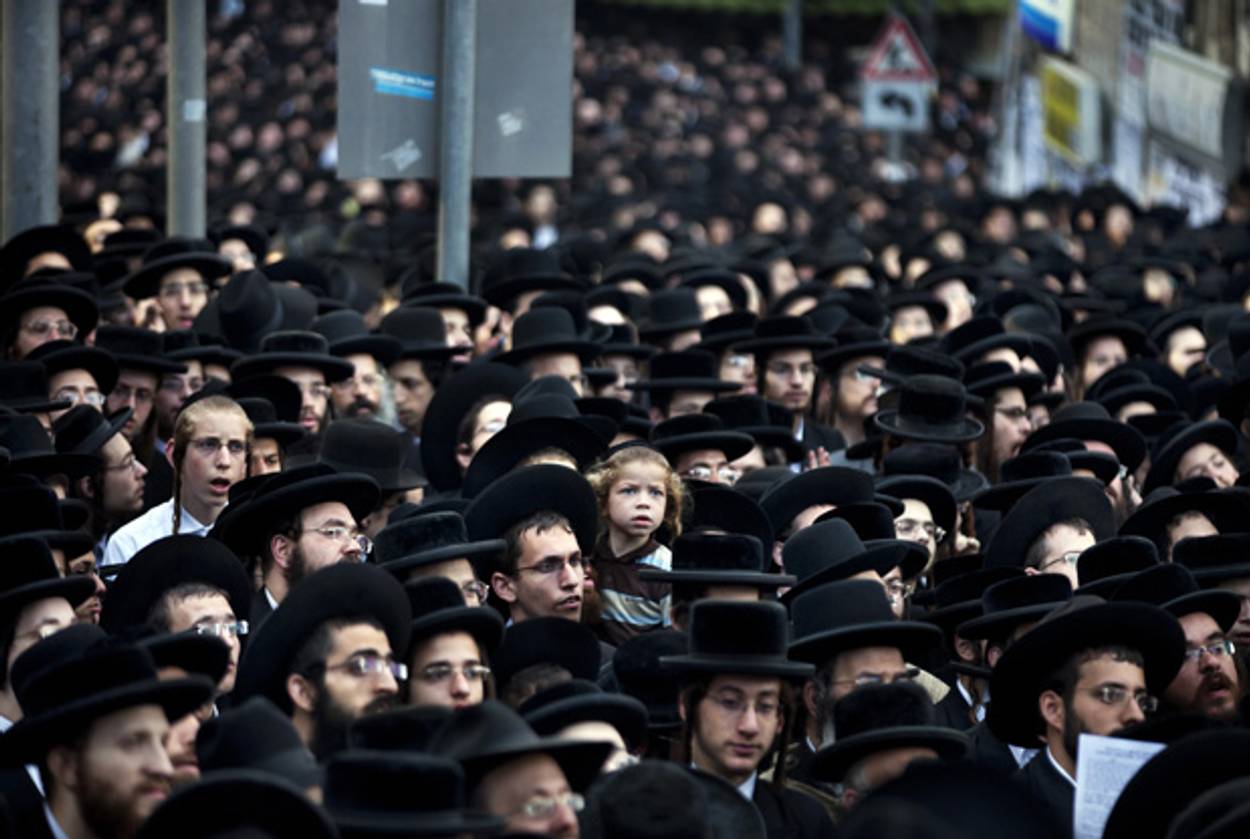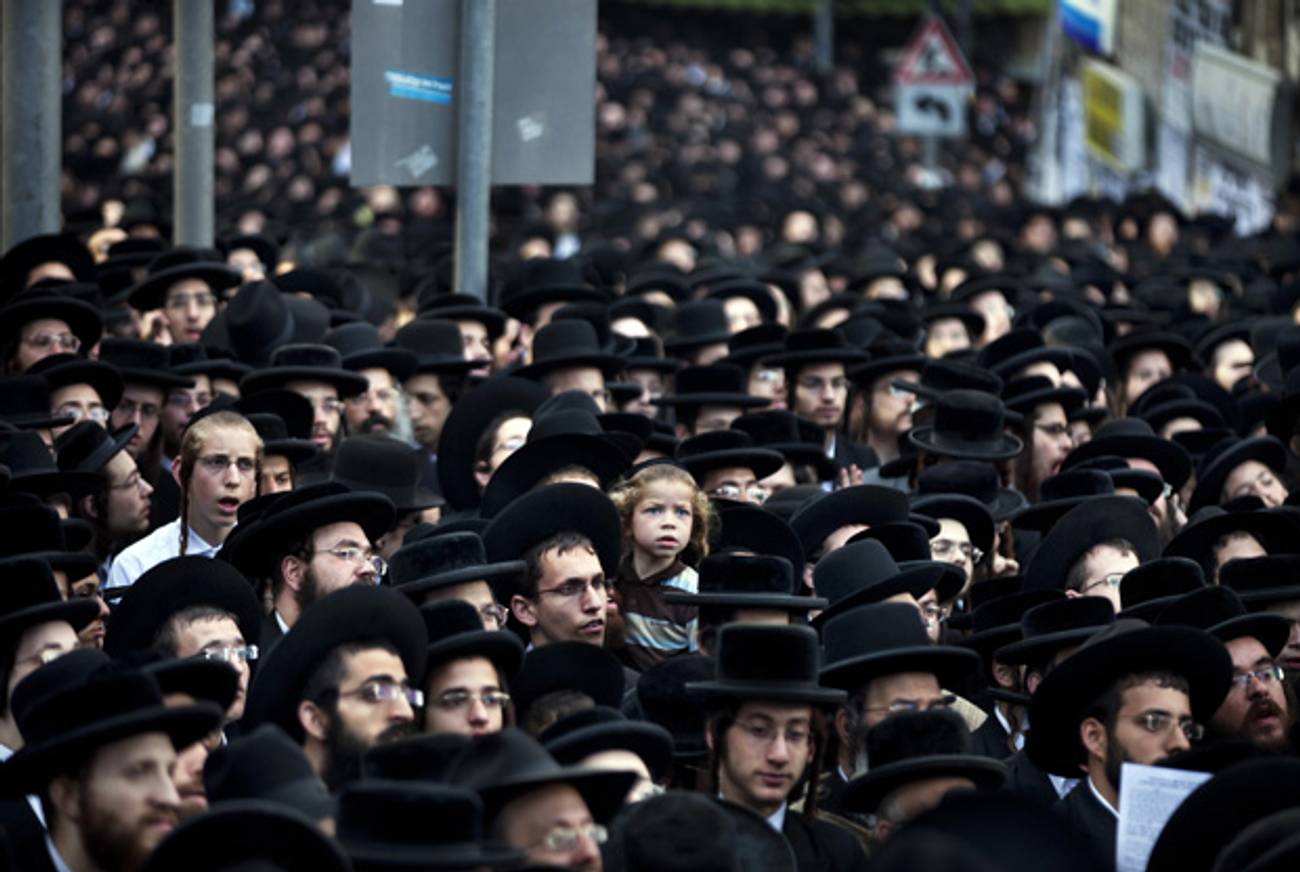Don’t Draft the Ultra-Orthodox
Israel should abandon its plan to make the ultra-Orthodox join the army and give them all jobs instead




Sometime in the fall of 1997, it hit me: I was a freier.
As anyone with a passing knowledge of Israeli culture knows, there’s no more dreaded term. Loosely translated, it means “sucker.” Carefully considered, it means that you’ve allowed someone else to take advantage, an existential failing in a nation dedicated to always flexing its muscles.
And yet, I could think of no mot more juste. I woke up one alabaster morning in my apartment in Tel Aviv, rushed over to the university to take a final exam, ran back to my car, laid the seat low, changed into uniform, and drove to an army base, an hour south, to begin three days of reserve duty. Because I had to work to put myself through college, I had to miss out on a few hectic days at the office, which meant longer hours when I got back from service, dusty and exhausted. I didn’t mind the sacrifice; reserve duty was never without its discrete pleasures, the sort of childish joys that are evident only when aging men reunite in the desert, without their bosses and girlfriends and wives, free of the constraints of personal hygiene, and in possession of jeeps and guns. What infuriated me was knowing that while I juggled work and school and military service, my vast family—cousins once and twice removed, in Jerusalem and Bnei Brak, all of them ultra-Orthodox—were attending their yeshivas peacefully. Unlike me, they were exempt from military service. Unlike them, I had to pay dearly for my tuition. And that just wasn’t fair.
This sort of blunt frustration has grown, in the last decade or so, to become the defining mood of secular Israelis. This weekend, a march is planned in Tel Aviv to demand the immediate drafting of the ultra-Orthodox. Among its organizers are the Masorti and the Reform movements, which, for years, rightly decried the intolerance of the Israeli religious establishment. Mandatory military service, apparently, is a worthy enough cause to convince these two movements to join up and march in support of restricting the religious rights of the more stringently observant. Also among the march’s organizers are an organization named Israel Hofshit—Israel is Free, dedicated to freedom of religion and equality in Israel—and a right-wing group called Im Tirzu. Israel Hofshit is a grantee of the New Israel Fund. Im Tirzu exists largely to devastate the NIF and is the organization behind the posters featuring the NIF’s former head, Naomi Hazan, with horns. Collaborating with political adversaries is a noble thing; but when someone puts Der Stürmer’s favorite visual metaphor to use in order to describe the group that pays your bills, you’d have to be blinded by hatred for the utlra-Orthodox in order to go ahead and co-sponsor a march.
* * *
Since at least 1999, the call to draft the approximately 50,000 yeshiva students currently exempt from military service has grown louder among large swaths of the Israeli electorate. A committee was formed, named after its head, former Supreme Court Justice Tzvi Tal. Temporary deferments were arranged, and lawsuits were filed, all leading up to the establishment of a 94-member unity coalition and the assembly of another committee, led by Kadima Member of Knesset Yochanan Plessner, charged with reaching a compromise posthaste. Plessner and his crew had just as much of a chance of prevailing as the Washington Generals do when they take the court to play the Harlem Globetrotters—before the committee even had a chance to deliberate, politicians lined up to outbark each other, demanding that all ultra-Orthodox—as well as all Israeli Arabs—either join the IDF or be made to commit several years to some form of national service.
Earlier this week, Netanyahu thanked Plessner et al. for their service and disbanded the committee—which leaves everyone in a bind. Kadima, having joined Netanyahu’s coalition primarily to resolve this particular issue, is threatening to pull out of the government. Without a political resolution, the army will soon have no choice but to act on its own, obey the law, and forcefully enlist the ultra-Orthodox. The ultra-Orthodox, on their end, are threatening to resist such a move by any means necessary.
Thankfully, there’s an easy solution: Instead of giving the ultra-Orthodox guns, give them jobs.
There are many reasons why abandoning the silly insistence on mandatory conscription makes perfect sense. First among them is basic human dignity: Rather than treating the ultra-Orthodox like a foreign element, Israeli society would do well to opt for a solution that’s more welcoming and respectful. But the chief reason not to draft the ultra-Orthodox is that the army couldn’t need them less.
For one thing, the IDF is already doing fine on its T3R. The latter stands for Tooth-To-Tail Ratio, or the ratio between an army’s combatant and noncombatant soldiers. The U.S. Army’s T3R is 1:5.25; the global average is 1:4. Israel, where conscription is mandatory, stands at 1:2.5, the fourth-highest T3R in the world. The trend everywhere is toward ever-lower T3Rs—with so much of modern warfare now relying on sophisticated and automated technological platforms, less and less boots are needed on the ground.
But isn’t the IDF different? Isn’t it facing more daunting tasks than most other armies? Perhaps, but whatever its undertakings, the IDF is meeting them in stride. A quick look at statistics shows that the army is doing fine on both the tooth and the tail ends. According to official IDF surveys from 2011—the last year for which data is available—more than 80 percent of young Israelis enlisting expressed a desire to serve as combat soldiers, an all-time high and a continuation of a trend going strong since at least 2005. In 2009, for example, the Golani combat brigade boasted on its Facebook page that there were now six applicants for every available spot. Even the less-radiant Armored Corps can afford to be choosy with its recruits.
Those who don’t find themselves on the front lines end up as support staff—and the army has plenty of this, too: A report released last winter, for example, revealed that the IDF’s personnel division, the backbone of the entire support-staff infrastructure, employed 20 percent more soldiers than it actually needed.
Let’s assume, then, that by some act of divine intervention all of the young ultra-Orthodox men voluntarily agree to trade their black coats for olive-green uniforms. If they turn to serve as noncombatants, they’ll soon find themselves—like many other noncombatant soldiers in the current IDF—doing little more than idling away their time. If they turn to serve as combat soldiers, they’ll be just as unnecessary. According to most assessments, it takes about seven months to satisfactorily train an effective infantryman, assuming that the trainee has a reasonable background of physical activity and is in passable shape. Yeshiva boys, for the most part, lead radically sedentary lives, and many do very little by way of exercise; it’s likely that they’ll need significantly more time to adjust to life as hill-storming, machine-gun-toting warriors. With the mandatory service capped at 36 months, the longer it takes the IDF to train a soldier, the less time said soldier has to serve actually performing his duties. Here, too, the ultra-Orthodox would be nothing but a further burden on the system.
I could go on and on. I could note that of those Israelis who fail to fulfill their military obligations, less than 20 percent are ultra-Orthodox. And I could mention that the rate of ultra-Orthodox voluntarily joining the IDF is on the rise: Since the army launched a program designed to accommodate fervently religious soldiers in 2007, more than 1,700 ultra-Orthodox men joined up of their own accord, leading the state comptroller to issue a report this year and state that “the IDF has met the goals set by the government [for voluntarily enlisting ultra-Orthodox soldiers], and then some.” I could even quote some of Israel’s leading pundits—like Ofer Shelah, a former officer and one of the country’s most revered journalists—in support of turning the IDF into a well-paid, all-volunteer army, which would probably make it leaner and more efficient. But the most valid argument, perhaps, is not factual but ideological: Israelis shouldn’t insist on drafting all ultra-Orthodox young men because there is no inherent value in military service as such. Military service, like paying taxes, is a necessity in a country like Israel. It’s the sine qua non of collective life in the Jewish state. Therefore, the state must make sure that it maintains an excellent and ever-ready army. To do that, it must consider military service a duty, but it should never regard it as a virtue.
Unfortunately, this seems to be the mindset of too many today, which is a pity. If Israelis abandoned this approach and thought rationally instead, they may discover far superior solutions. A good start might be directing these scores of religious students not to army bases but to, say, computer schools: A mind trained in reading line after line of scripture and closely following the most minute details should have no problem adjusting to computer programming, or data entry, or any number of useful professions. Like most countries in the world, Israel, too, is experiencing a severe shortage of qualified software savants who can write code; it has at its disposal 50,000 preternaturally gifted candidates for this job precisely. Train them, and the ultra-Orthodox will help grow the economy, bettering themselves at the same time. As they’re currently the most impoverished sector of society, and subsist primarily from federal funds, their new-found wealth might mean that they’ll depend less on the state, which would mean lower taxes for everybody. Israelis would have to be total freiers to pass up on such an opportunity.
***
Like this article? Sign up for our Daily Digest to get Tablet Magazine’s new content in your inbox each morning.
Liel Leibovitz is a senior writer for Tablet Magazine and a host of the Unorthodox podcast.
Liel Leibovitz is editor-at-large for Tablet Magazine and a host of its weekly culture podcast Unorthodox and daily Talmud podcast Take One. He is the editor of Zionism: The Tablet Guide.